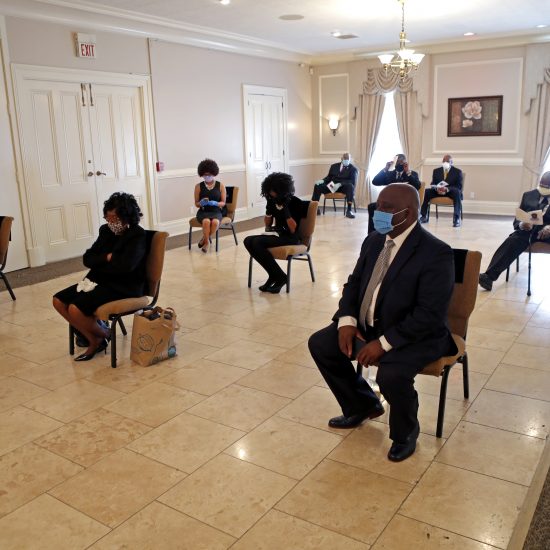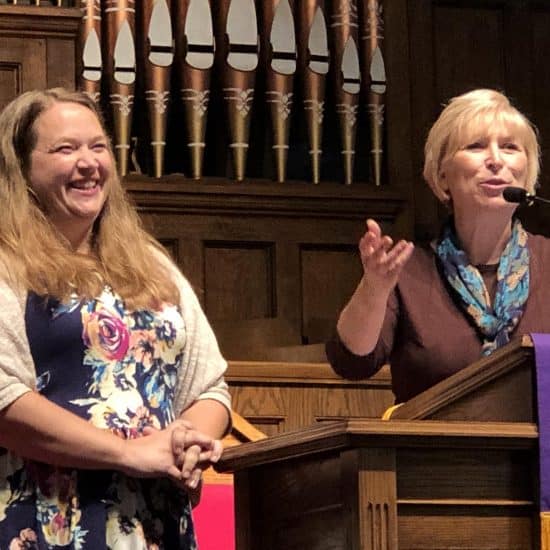DALLAS — The late Herbert H. Reynolds, longtime president of Baylor University, was praised recently by one of Congress' most ardent defenders of church-state separation as a mentor who "ignited my passion for religious liberty and separation of church and state."
"Dr. Reynolds sent me on a journey that would change my life," said Rep. Chet Edwards (D-Texas) in a videotaped tribute during an April 23 banquet in Dallas honoring Reynolds' contributions to the Baptist principle of religious freedom. Reynolds died in 2007.
Members of Reynolds' family were on hand to receive the Associated Baptist Press Religious Freedom Award on his behalf. The posthumous honor was bestowed by ABP's board of directors in conjunction with its semi-annual meeting.
Edwards noted that early in his congressional career Herb Reynolds sent him a copy of a famous speech defending church-state separation that George W. Truett, then pastor of First Baptist Church in Dallas, delivered on the United States Capitol steps in 1920.
Truett's address and Reynolds' patient tutelage galvanized the young congressman's commitment to religious liberty as integral to both American democracy and Christian theology, Edwards said. Since then, Edwards has become widely known for his strong stands on strict church-state separation.
"I think [Reynolds] knew what he was doing to awaken me to the cause of religious liberty," he said. "Whatever I've been able to accomplish in Congress [related to religious liberty] is totally to the credit of Dr. Reynolds…. If he were here he would remind us that protecting religious liberty is an uphill fight that always requires diligence."
Edwards, a 2003 recipient of the ABP award, represents the Central Texas congressional district surrounding Waco, where Baylor is located. He attends Calvary Baptist Church in Waco.
Joy Reynolds, accepting the award on her late husband's behalf, thanked ABP's directors and guests at the banquet for honoring Reynolds' great passion for one of his favorite causes. "Herb truly believed in religious freedom," she said. "His favorite thing to say was that God wants free worshipers and no other kind."
In a brief address, Steven Sadler, senior lecturer in religion at Baylor, emphasized that Reynolds through his leadership "embodied the spirit of first Amendment freedoms," contributing not only to academic freedom but also to the value of a free press and to the role of ABP as an independent news service.
Sadler said Reynolds supported religious liberty by:
• Protecting academic freedom. Reynolds understood that "freedom of speech in the classroom was absolutely necessary" for the integrity of a faith-based community of learning. Reynolds, Sadler recalled, told Baylor faculty on his first occasion to address them as president, "I shall be prepared to resign at any time I am unable to guarantee you the freedom from undue constraint and an independent voice in the life of this institution."
• Protecting students' freedom of speech. As an example, Reynolds led the effort to create a more sophisticated evaluation of faculty that gave a voice to students and teachers.
• Protecting theological education. Reynolds' vision led to the creation of Baylor's George W. Truett Theological Seminary. Rather than theological education that spoon feeds students a "set of provincial truths," Reynolds "made sure freedom of speech was imbedded in theological education."
The ABP board meeting was its first since a staff reorganization last fall. Longtime ABP Executive Editor Greg Warner announced last August that he was stepping down for health reasons.
In October, longtime Baptist communications professional David Wilkinson, assumed the newly created position of executive director. He functions as the news service's chief executive officer with primary responsibilities in administration and fund raising.
Warner's editorial responsibilities were assumed by Robert Marus, former news editor and Washington bureau chief, who was promoted Jan. 1 to the new position of managing editor. Marus also continues to head the Washington bureau.
Veteran Baptist journalist Bob Allen returned to ABP's staff in October to fill the new position of senior writer.
Wilkinson, in his executive director's report, told the board that ABP has had a remarkable past, but that even the most effective organizations must change the way the way they do their business without doing damage to their core mission.
"I'm convinced that ABP is a trusted source of news and information for progressive Baptists and many traditional Baptists," he said. "There is a considerable amount of respect in Baptist life for ABP and its role. We are the reporters, the documenters, the chroniclers of the Baptist movement and the Baptist understanding of the gospel."
He continued: "But we are more than that; we are also the truth-tellers whose stories, whose questions, whose reporting speaks to power and holds organizations and their leaders accountable to those who elected them and to those whom they were appointed to serve. We are the proverbial watchdogs in Baptist life. Now, that may not be the most attractive moniker to have…but of all God's people in the world, it is Baptists who should be the No. 1 champions of that vital role."
In other action, ABP directors approved four nominees to the board. Harriet Harral, a Fort Worth, Texas, organizational consultant, and Brian Unger, a Liberty, Mo., accounting executive, are returning to the board after absences they took to avoid conflicts of interest. Harral, who resigned to serve a three-year term as an elected official of the Cooperative Baptist Fellowship, is a member of Broadway Baptist Church in Fort Worth. Unger, who took a leave of absence to serve as a health-benefits advocate for Warner as the former editor began his transition to permanent medical disability, is a member of Second Baptist Church in Liberty.
The board also approved new members Anne Guidry, a Jackson, Miss., communications executive and member of Northminster Baptist Church, and Kyle Reese, pastor of Hendricks Avenue Baptist Church in Jacksonville, Fla.


